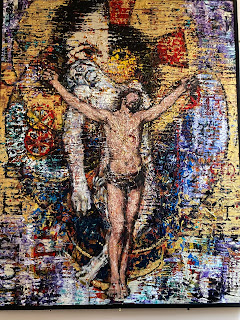Finding Ourselves in the Stories
It was a typical Sunday morning during the children’s
message when all of a sudden, right before our eyes, one of the kids
disappeared. Literally, the three year old crawled past the curtains covering
the front of the temporary staging and through a maze of aluminum posts and
crossbeams all the way to the back wall, approximately twelve feet away. I
tried to carry on the service while parents and teachers attempted to subtly
coax the child out. I could see by the panicked and exasperated looks on their
faces the effort was in vain. It soon became apparent that we would need to
stop the service, have someone crawl underneath and help the child out. So we
paused worship, several of us got on hands and knees, approaching from
different directions, and safely recovered the child.
Needless to say, when I returned to leading the service, an
impromptu scripture change was in order. The substituted scripture revealed the
story of Jesus telling about the lost sheep and the shepherd who left the
ninety-nine to go looking for it. How could we talk about anything else? We
entered the story that morning, stopping worship to look for one of our
children. It became real before our eyes. None of us who were there will ever
hear or read that scripture again without thinking of the child who disappeared
in the middle of worship. God used a wandering three year old to wake us up to
a truth of the Gospel, and if we hadn’t seen ourselves in that story we would
have missed a powerful worship moment.
One of the beautiful things about the Bible is that it
invites us to find ourselves in the stories. Stories like The Exodus from Egypt, The Prodigal Son, The Good Samaritan, and The Parable of the Lost Sheep are more
than ancient tales; they reveal something of what it means to be human and what
it means to be in relationship with God. The scriptures give us a framework to
understand the events of our lives and to better see how God is working in them.
It was not by accident that Martin Luther King, Jr. and the civil rights
leaders believed the civil rights movement to free blacks from oppression was simply
a modern day version of God freeing the Hebrew people from the Egyptians (as
told in Exodus). This enabled them to see these events of history, not as a
political movement, but a spiritual awakening.
So find yourself in the stories. When you read the Bible,
see if you find yourself wandering through some desert with Moses, struggling
alongside the disciples to understand some radical teaching presented by Jesus,
feeling the gentle touch of Jesus on the wounds of life, or sitting with him in
some quiet place of prayer. When we find ourselves in the stories, the Bible
truly comes alive and we discover a spiritual awakening.
Together we are the hands and feet of Jesus,
Brett


Comments
Post a Comment